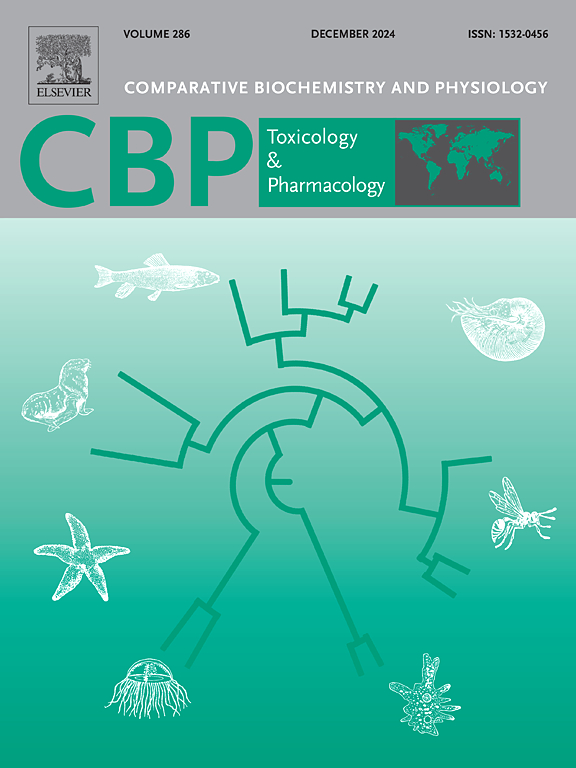GW-9662, a peroxisome proliferator-activated receptor γ (PPARγ) inhibitor, impairs early embryonic development in zebrafish
IF 4.3
3区 环境科学与生态学
Q2 BIOCHEMISTRY & MOLECULAR BIOLOGY
Comparative Biochemistry and Physiology C-toxicology & Pharmacology
Pub Date : 2025-08-21
DOI:10.1016/j.cbpc.2025.110332
引用次数: 0
Abstract
Peroxisome proliferator-activated receptor γ (PPARγ) functions as a nuclear transcription factor with primary roles in lipid and glucose metabolism and adipocyte differentiation. Despite intensive research in metabolic contexts, its role during early vertebrate development remains underexplored. Our study focused on understanding PPARγ's developmental role by using a PPARγ antagonist, GW-9662 (GW), in zebrafish embryos. We exposed embryos to GW from 6 hours post-fertilization (hpf) to 24 hpf and observed that the embryos were ventralized by 24 hpf. Western Blot and immunohistochemistry for PPARγ protein demonstrated that GW-mediated PPARγ inhibition may be localized within the embryos. Transcriptomic analysis revealed that exposure to GW led to dysregulation of multiple biological pathways, including cytoskeletal organization, lipid biosynthesis, and epithelial-to-mesenchymal transition (EMT). Immunohistochemistry further validated these findings, demonstrating increased lipid accumulation, cytoskeletal disruption, and altered EMT markers. Our findings suggest that while GW plays a crucial role in multiple physiological processes during early embryogenesis, further research is needed to examine if these impacts are mediated by PPARγ.

GW-9662是一种过氧化物酶体增殖物激活受体γ (PPARγ)抑制剂,可损害斑马鱼的早期胚胎发育
过氧化物酶体增殖物激活受体γ (PPARγ)是一种核转录因子,在脂质和糖代谢以及脂肪细胞分化中起主要作用。尽管在代谢背景下进行了深入的研究,但其在早期脊椎动物发育中的作用仍未得到充分探索。我们的研究重点是通过使用PPARγ拮抗剂GW-9662 (GW)在斑马鱼胚胎中了解PPARγ的发育作用。我们将胚胎从受精后6小时(hpf)暴露到24 hpf,观察到胚胎在24 hpf下腹化。Western Blot和免疫组化检测显示,gw介导的PPARγ抑制可能局限于胚胎内。转录组学分析显示,暴露于GW会导致多种生物学途径的失调,包括细胞骨架组织、脂质生物合成和上皮-间质转化(EMT)。免疫组织化学进一步证实了这些发现,表明脂质积累增加,细胞骨架破坏,EMT标记改变。我们的研究结果表明,虽然GW在早期胚胎发生的多个生理过程中起着至关重要的作用,但需要进一步研究这些影响是否由PPARγ介导。
本文章由计算机程序翻译,如有差异,请以英文原文为准。
求助全文
约1分钟内获得全文
求助全文
来源期刊
CiteScore
7.50
自引率
5.10%
发文量
206
审稿时长
30 days
期刊介绍:
Part C: Toxicology and Pharmacology. This journal is concerned with chemical and drug action at different levels of organization, biotransformation of xenobiotics, mechanisms of toxicity, including reactive oxygen species and carcinogenesis, endocrine disruptors, natural products chemistry, and signal transduction with a molecular approach to these fields.

 求助内容:
求助内容: 应助结果提醒方式:
应助结果提醒方式:


